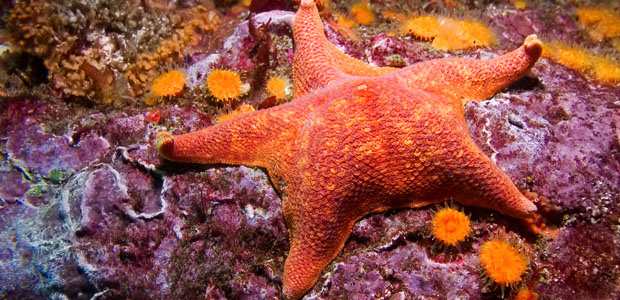Advertisement
Wildlife Wednesday: Sea Star
From Patrick Star to that fellow in Finding Nemo, the sea star (or starfish) is pretty famous. While not endangered, it has been garnering some extra attention lately—and not for being the star of any cartoon. The population of sunflower sea stars on BC’s West Coast has dwindled in just a few weeks, leaving researchers … Continued

From Patrick Star to that fellow in Finding Nemo, the sea star (or starfish) is pretty famous. While not endangered, it has been garnering some extra attention lately—and not for being the star of any cartoon. The population of sunflower sea stars on BC’s West Coast has dwindled in just a few weeks, leaving researchers puzzled about this disappearing act.
Habitat
Sea stars decorate all the oceans of the world (and will hopefully continue to do so).
Trivia
- Sea stars have no brains or blood; in fact, filtered sea water flows through their bodies.
- Sea stars are carnivores with a talent that’s pretty cool (or gross, if you happen to be eating right now). Sack-shaped stomachs can extend out of their mouths to snag prey, allowing sea stars to digest food outside their bodies.
- Sea star species total about 2,000—some of which have up to 40 arms!
- Some sea stars can grow an entirely new body from a severed limb—giving my beloved axolotls some competition in the area of regeneration.
Why are sea stars disappearing?
Staff from the Vancouver Aquarium are calling this phenomenon Sea Star Wasting Syndrome. Dead and decomposing sunflower sea stars were first noticed last month in a popular diving area near West Vancouver. Then it was only a matter of weeks before—poof! Thousands disappeared from sea star hotspots such as Howe Sound and Vancouver Harbour.
This seems mystifying given that sea star numbers have only grown in recent years. But overpopulation may have been a problem too, leading to a disease that could jump from sea star to sea star. A similar case of boom and bust in sea star populations was also noted from New Jersey to Maine back in July.
Researchers are still looking into ways to stem the spread of Sea Star Wasting Syndrome, but sightings of a few baby sea stars in BC waters may be an optimistic sign. We can also help the Vancouver Aquarium to monitor the health of local populations by reporting any sightings of dead, decaying, or mushy-looking sea stars to fishlab@vanaqua.org.





